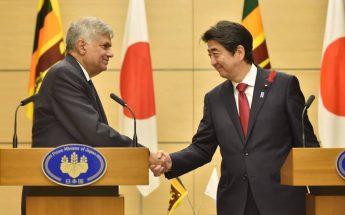
Japan reinforces maritime security ties with Sri Lanka to counter China
The project, which aims to contribute toward the improvement of maritime safety capability of the Sri Lanka Coast Guard (SLCG), also allows Sri Lanka to procure two petrol vessels to ensure safe navigation of vessels, anti-piracy and transnational crime countermeasures and prevention of destruction of marine environment and resources.The agreement, which was signed in Colombo, also made way for Japan to provide training for Sri Lanka's coast guard personnel.
The project deal was signed just a month after Japanese Prime Minister Shinzo Abe underscored the 'importance of maintaining the freedom of the high seas and maritime order based on the rule of law' at a meeting with Sri Lankan President Maithripala Sirisena on the sidelines of the G7 summit held in Nagoya, Japan.
Abe's declaration comes amid China's increasing maritime initiatives in the South Asian region, including in Sri Lanka and Bangladesh, which have sparked concern among countries such as Japan and India. Both Japan and China are among Sri Lanka's main foreign funders, and Colombo, over the years, has tried to strike a balance between the two countries.
While Japan is showing more interest in enhancing maritime cooperation with Sri Lanka, over 55 port calls have been made since 2009 by Japanese Maritime Self-Defence Force (JMSDF) and the Japanese Coast Guard (JCG) ships.
The Sri Lanka-Japan Dialogue on Maritime Security, Safety and Oceanic Issues kicked off in Colombo in January this year. During the meeting, Japanese Ambassador to Sri Lanka, Kenichi Suganuma, said securing freedom of navigation and safety of sea routes is a major concern for Japan adding they wish to see the establishment of an open, stable ocean where rule of law dominates.
Maritime expert Rohan Masakorala said that while Sri Lanka enjoys good relationship with Japan and China, efforts must be made to maintain this cordial relationship and discourage disputes in the Indian Ocean.
'Issues will come from time to time as all are looking for resources to sustain demand, but it is important that all must work toward diplomatic solutions. A legal framework that is practicalto all must befound to manage oceans and resources,' Masakorala, the immediate past Secretary General of the Asian Shippers' Council, told Asia Times.
Citing as to why Japan finds Sri Lanka increasingly important in the region, he said in the backdrop of Asia's growing inter regionaltrade, a strategic maritime location such as Sri Lanka is vital for strong nations to ensure trade and security.
He said Sri Lanka must take cue from countries like Singapore and learn to play the balancing act well.
'As a small country, Sri Lanka must not only balance Japan and China but all regional and global powers like how Singapore has done, it is one of the best examples of how we should fit in to the global economy and politics,' said Masakorala who is also the CEO of the Shippers' Academy in Colombo.
China's Belt and Road initiative can benefit not just China but even Sri Lanka due to its strategic location in the region.
Masakorala said: 'China's One Belt One Road is of course theirgrand plan to link trade with continents, including emerging Africa, and to access new markets both by sea and land as its population grows and the demand for energy and trade increases.
"In this sense, Sri Lanka is important as a strategic maritime mode for supply chain security, and in the future it will be a good low-cost distribution and a transshipment location for shipping and logistics as it sits between Dubai and Singapore and will serve as a gateway to Asia and probably Hong Kong to India."
Munza Mushtaqis a journalist based in Colombo, Sri Lanka. She is the former news editor of two leading Sri Lankan newspapers; The Nation and theSundayLeader. She writes extensively on Sri Lankan current affairs with special focus on politics, human rights and business issues. She is currently the Colombo-based correspondent for International News Services, the Los Angeles Times and the Nikkei Asian Review.
(Copyright 2016 Asia Times Holdings Limited, a duly registered Hong Kong company. All rights reserved. Please contact us about sales, syndication and republishing.)

Legal Disclaimer:
MENAFN provides the
information “as is” without warranty of any kind. We do not accept
any responsibility or liability for the accuracy, content, images,
videos, licenses, completeness, legality, or reliability of the information
contained in this article. If you have any complaints or copyright
issues related to this article, kindly contact the provider above.


















Comments
No comment